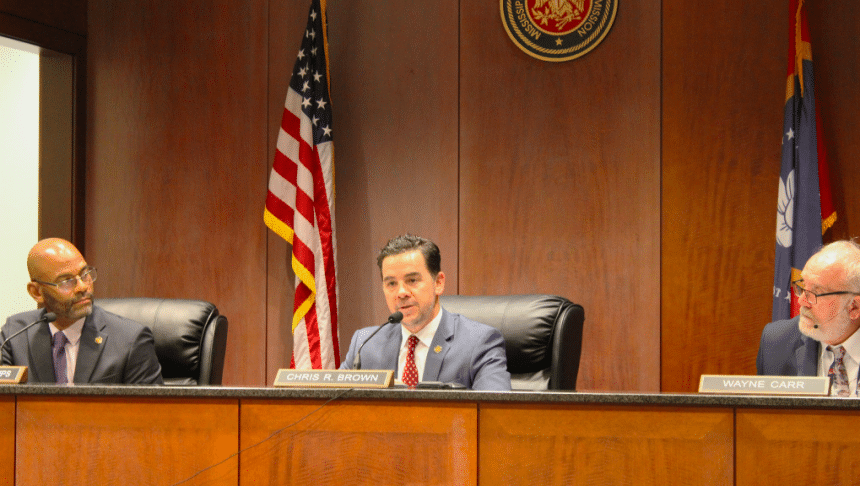The Mississippi Public Service Commission announced during a Tuesday meeting that it will be imposing a $12,500 daily fine against the city of Holly Springs for its failure to provide adequate utility services to its residents. The announcement follows years of alleged malpractice by the city in managing the Holly Springs Utility Department, or HSUD, and a long history of frequent power outages.
Commission Chairman Chris Brown explained that the $12,500 penalty could be imposed daily as long as the city of Holly Springs is not taking necessary steps to shore up its utility services. The commission, at its own discretion, could also impose a lesser fine or even waive fees if it finds that the city is moving in the right direction or elects to sell the utility.
“By doing this, we are telling [city officials] that we are very serious and that we’re not going to back down. We are going to make sure that those people have the services that they deserve,” Brown said, later adding, “We take our charge very seriously. The people of Mississippi deserve reasonably adequate services. We’re committed to that.”
While all three commissioners ultimately agreed to penalize HSUD, Central District Commissioner De’Keither Stamps had initial reservations. Stamps was concerned about when the fines would be due, how the city of Holly Springs would pay them, and if the fees would burden ratepayers.
“How would they pay [the fine]? Because a utility only has ratepayers’ money,” Stamps asked. “How would the fine be paid? Where would the money even come from? Property taxes?”
The commission’s legal representation assured that the fines could not be imposed on the utility ratepayers but acknowledged that Holly Springs officials would have to “figure it out” when it came to the city’s ability to pay. The money from the fines would go into the state’s general fund, and Brown said that the commission could urge the legislature to appropriate those funds for HSUD improvements.
Stamps also challenged penalizing the current Holly Springs mayoral administration, which has seemingly been more willing to work with state regulators than the previous one. Brown noted that city representatives have said it would take at least two years to have HSUD compliant with regulatory standards. Two years’ worth of $12,500 daily fines would equal a bill of more than $9 million being imposed on the city of Holly Springs.
Brown contended that the city had previously mismanaged around $400,000 in funds appropriated by the state that were intended to benefit HSUD, leaving the commission with no other choice but to levy penalties that would either push officials to take swift action to remedy the utility or sell it to another entity.
“From what we’ve heard, there has been a series of mismanagement and misappropriation, possibly, of funds to not go back and reinvest in that system,” Brown said. “It’s a hard decision that [the city] will have to make to start reallocating any funds that the city has to go back into that system to make it reasonably adequate.”
Southern District Commissioner Wayne Carr argued that it was more important to focus on how ratepayers’ money was being spent while receiving inadequate services than it was to be concerned with how the city of Holly Springs would be able to afford its fines.
Carr later told SuperTalk Mississippi News that he would be open to supporting legislation that would give the commission more oversight into how a public utility utilizes funds it accrues from ratepayers if the services being provided are not up to par.
“Our citizens deserve better. Let’s think about where the citizen pays his money,” Carr said. “The questions that [the citizen] may be asking are, ‘Where is my money going?’ and ‘What are they doing with it?’ The city sat back and watched idly for decades while the citizens asked the same questions.”
Along with the fines, the Mississippi Public Service Commission will approach the court system to attempt to have HSUD put under receivership. Receivership means the utility would be managed by a neutral third party, as is the case in Jackson regarding the city’s water system.
Backstory
For decades, HSUD customers have complained that unreliable power has been a persistent issue in their homes and businesses. HSUD serves roughly 12,000 customers, nearly 80% of whom do not live in Holly Springs. The service area encompasses its home city, along with parts of Marshall, Benton, and Lafayette counties in Mississippi and Hardeman and Fayette counties in Tennessee.
With HSUD being managed solely by city officials, those living outside of the Holly Springs city limits are virtually powerless when it comes to the services they receive, which has been a focal point of the outcry against the public utility. To address these concerns, Brown petitioned the state legislature to pass Senate Bill 2453 during the 2024 session. The bill expanded the commission’s authority over public utilities.
Brown and his commission colleagues utilized the new power to have Silverpoint Consulting, an independent firm, look into complaints levied against HSUD. While at first, Holly Springs officials were able to skirt subpoenas and a show-cause hearing facilitated by the commission, a change in leadership within city hall proved effective in moving the proverbial ball in the right direction.
During April’s municipal primaries, Charles Terry, a former Marshall County supervisor, defeated incumbent Democratic Mayor Sharon Gipson. Terry went on to win the mayor’s seat, and, according to Brown, was much more cooperative with independent investigators and regulators in their pursuit to get to the root of HSUD’s problems.
The new mayor’s compliance has been a breath of fresh air for the commission and the Tennessee Valley Authority, the nation’s largest public utility and the entity that sells wholesale power to HSUD, but it did not change how regulators planned to proceed following Silverpoint’s investigation, despite rumors that had circulated of a deal being struck.
In a scathing 75-page report, Silverpoint found that several years of mismanagement caused HSUD to spiral into a degenerative state. The firm’s investigation of HSUD encompassed a broad range of areas, including system operations, vegetation management and other preventative maintenance, emergency preparedness and response, system planning and analysis, and support functions such as metering and billing.
Blatant issues such as vegetation overgrowth along power lines, substations that have been near-abandoned to the point that the entire system’s reliability is in peril, and flawed emergency response practices — all of which could put area residents in imminent danger — have been the product of a lack of leadership within HSUD, per Silverpoint.
During its August public meeting, the Public Service Commission ordered HSUD leadership to appear in the city of New Albany’s municipal courtroom for a show-cause hearing.
At the Sept. 4 hearing, Silverpoint Consulting outlined its report on HSUD’s provision of electric utility services, while Holly Springs leaders were able to respond to the findings. The public, which arrived in droves, had the chance to weigh in on HSUD’s scope of service, and the commissioners were active participants.
During the hearing, city officials admitted to Brown that HSUD is not adequately serving its customers. Commissioner Carr asserted that the city’s current administration also failed to provide a viable explanation as to how it planned to shore up the utility, leading to Tuesday’s imposition of a fine and the announcement that the commission will push for a third party to take over the utility system.
“Those newly elected officials were elected. They need to figure it out,” Carr said on the city’s responsibility to keep HSUD up to code. “Our job is to make sure that they figure it out. They need to give us a plan. They came to that meeting with no plan. I didn’t hear one [official] say, ‘Hey, here’s our plan.’ It’s sad.”








